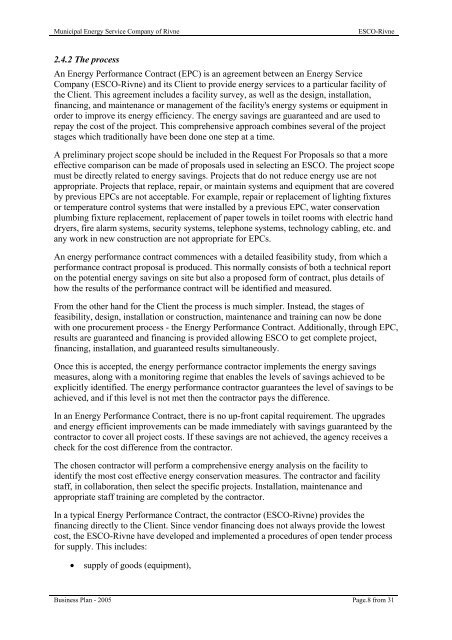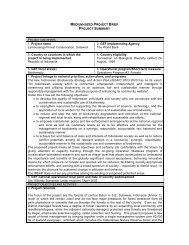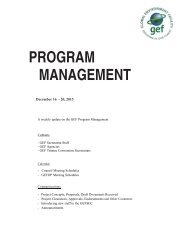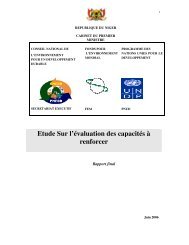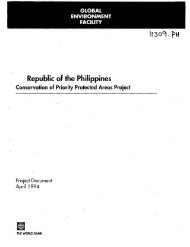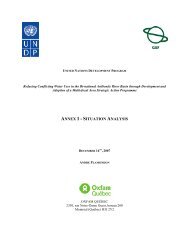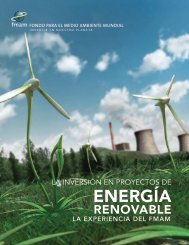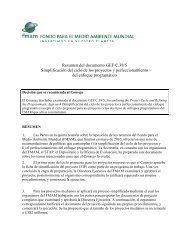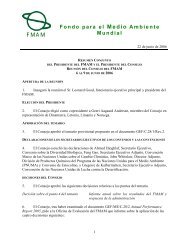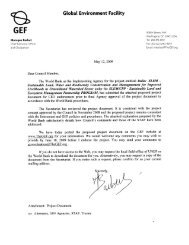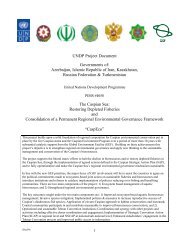Business Plan ESCO - Rivne - Global Environment Facility
Business Plan ESCO - Rivne - Global Environment Facility
Business Plan ESCO - Rivne - Global Environment Facility
You also want an ePaper? Increase the reach of your titles
YUMPU automatically turns print PDFs into web optimized ePapers that Google loves.
Municipal Energy Service Company of <strong>Rivne</strong> <strong>ESCO</strong>-<strong>Rivne</strong><br />
2.4.2 The process<br />
An Energy Performance Contract (EPC) is an agreement between an Energy Service<br />
Company (<strong>ESCO</strong>-<strong>Rivne</strong>) and its Client to provide energy services to a particular facility of<br />
the Client. This agreement includes a facility survey, as well as the design, installation,<br />
financing, and maintenance or management of the facility's energy systems or equipment in<br />
order to improve its energy efficiency. The energy savings are guaranteed and are used to<br />
repay the cost of the project. This comprehensive approach combines several of the project<br />
stages which traditionally have been done one step at a time.<br />
A preliminary project scope should be included in the Request For Proposals so that a more<br />
effective comparison can be made of proposals used in selecting an <strong>ESCO</strong>. The project scope<br />
must be directly related to energy savings. Projects that do not reduce energy use are not<br />
appropriate. Projects that replace, repair, or maintain systems and equipment that are covered<br />
by previous EPCs are not acceptable. For example, repair or replacement of lighting fixtures<br />
or temperature control systems that were installed by a previous EPC, water conservation<br />
plumbing fixture replacement, replacement of paper towels in toilet rooms with electric hand<br />
dryers, fire alarm systems, security systems, telephone systems, technology cabling, etc. and<br />
any work in new construction are not appropriate for EPCs.<br />
An energy performance contract commences with a detailed feasibility study, from which a<br />
performance contract proposal is produced. This normally consists of both a technical report<br />
on the potential energy savings on site but also a proposed form of contract, plus details of<br />
how the results of the performance contract will be identified and measured.<br />
From the other hand for the Client the process is much simpler. Instead, the stages of<br />
feasibility, design, installation or construction, maintenance and training can now be done<br />
with one procurement process - the Energy Performance Contract. Additionally, through EPC,<br />
results are guaranteed and financing is provided allowing <strong>ESCO</strong> to get complete project,<br />
financing, installation, and guaranteed results simultaneously.<br />
Once this is accepted, the energy performance contractor implements the energy savings<br />
measures, along with a monitoring regime that enables the levels of savings achieved to be<br />
explicitly identified. The energy performance contractor guarantees the level of savings to be<br />
achieved, and if this level is not met then the contractor pays the difference.<br />
In an Energy Performance Contract, there is no up-front capital requirement. The upgrades<br />
and energy efficient improvements can be made immediately with savings guaranteed by the<br />
contractor to cover all project costs. If these savings are not achieved, the agency receives a<br />
check for the cost difference from the contractor.<br />
The chosen contractor will perform a comprehensive energy analysis on the facility to<br />
identify the most cost effective energy conservation measures. The contractor and facility<br />
staff, in collaboration, then select the specific projects. Installation, maintenance and<br />
appropriate staff training are completed by the contractor.<br />
In a typical Energy Performance Contract, the contractor (<strong>ESCO</strong>-<strong>Rivne</strong>) provides the<br />
financing directly to the Client. Since vendor financing does not always provide the lowest<br />
cost, the <strong>ESCO</strong>-<strong>Rivne</strong> have developed and implemented a procedures of open tender process<br />
for supply. This includes:<br />
• supply of goods (equipment),<br />
<strong>Business</strong> <strong>Plan</strong> - 2005 Page.8 from 31


